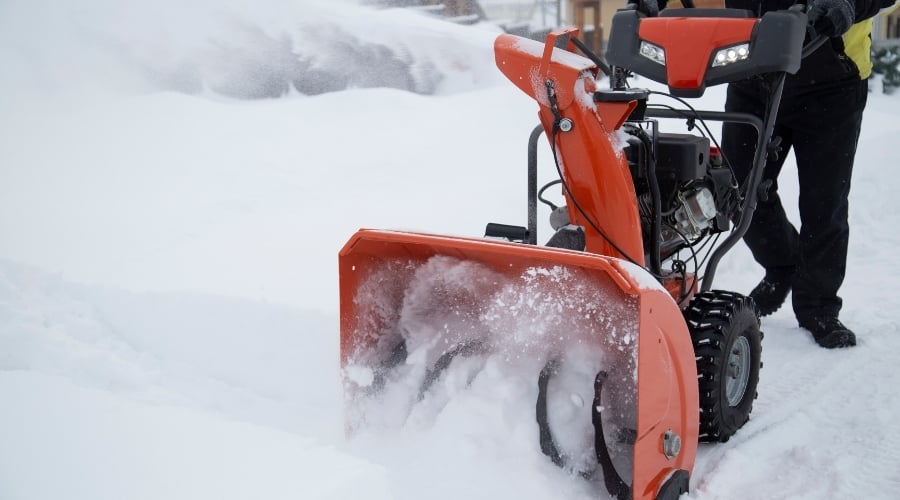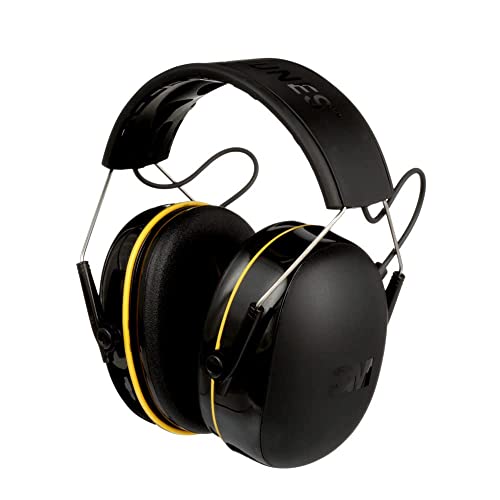There are over five and a half thousand snowblower-related hospital visits each year. No doubt you need to be careful with machines, especially those with rapidly spinning augurs that tear through snow and ice. However, few people consider longer-term issues like hearing damage from the noise of their machines.
Are snowblowers quiet? I’ll teach you everything you need to learn about decibels and snowblowers, so you don’t become a wintertime statistic.
Table of Contents
Are Snow Blowers Quiet
Snowblowers have a decibel level of 90 to 100 on average, which is not quiet. Any sound louder than 85 decibels, will do damage to your ears over time. Even though battery-powered snowblowers are quieter than gas-powered, Craftsman and Troy Bilt offer models with more insulated engines and muffler variations that reduce noise up to 45 percent.
How Quiet Are Snow Blowers
Snowblowers are not quiet. Think of it as louder than someone yelling in both your ears without pausing for a breath.
Worse still, one of the significant problems of shopping for a blower is that not all manufacturers reveal the decibel level of their machines. Finding information on it can be downright tricky.
The good news is that, when you live somewhere it snows, the neighbors are probably used to hearing snowblowers in the very early hours of the morning.
If you leave for work at six a.m., waiting until eight or nine to clear the driveway is not a practical solution. Sadly, that means you can expect to get woken up by other people’s blowers.
Snow Blower Noise Levels
Before we look at how quiet or loud a snowblower is, it helps us better understand what noise levels mean. A bunch of numbers won’t help unless you have some perspective. Otherwise, loud and quiet are only concepts.
Humans hear sounds between 0 and 140 decibels. Zero is not the absence of sound but rather indicates that something is too quiet for us to perceive. Whispers are around thirty decibels.
A sound louder than 85 decibels will do damage over time. That’s just slightly louder than your average coffee grinder.
Meanwhile, a hundred and twenty is only okay for about five minutes before it starts to cause permanent damage.
Anything over a hundred twenty causes instant damage to your ears, and by one hundred thirty, it causes physical pain.
Think of really loudspeakers, screaming in a megaphone, and similar sounds as the loudest we can stand. Jet engines are 150 decibels from thirty meters away, which is why people working on airfields wear ear coverings at all times.
According to Stac-UK, snowblowers are in the 100 to 110 range, or about the same as motorcycle engines. At your ear opening, it will be at least ninety decibels, which means you’re slowly injuring your ears.
Are Electric Snow Blowers Quiet
Electric snowblowers are quieter than gas-powered varieties. The cordless blowers are widely accepted as the least noisy, while corded machines are less loud than gas engines but still far from silent.
Sadly, there’s little research comparing decibel levels.
According to one contributor on Snowblower Forums, “My Ariens 926 is about 98db standing behind it.” While that’s still too loud for unprotected ears, it is a dozen or so decibels less than an average gas blower.
The downside to using a quiet snowblower is that they are also usually significantly less powerful. You will need a larger gas blower if you have a lot of space to clear or if you’re dealing with deep snow.
Moreover, the gas blowers are also frequently faster by several miles per hour.
Are Gas Snow Blowers Quiet
Gas snow blowers are not quiet at all. More importantly, they have a lower frequency than other outdoor tools like leaf blowers and string trimmers.
While the high-pitched noise may seem more annoying, a more bass sound is more capable of penetrating walls and other barriers. The sound travels further.
It’s safe to assume your gas snow blower is running at or over 100 db. Both Craftsman and Troy Bilt offer models with more insulated engines and muffler variations.
While these claim to reduce noise up to 45 percent, I couldn’t find a single study proving the actual decibel ratings, nor could I find a listing for the supposed noise level.
There is anecdotal evidence saying that they are quieter, but nothing concrete.
How To Make Snow Blower Quiter
Unfortunately, there is no practical solution that will make a snowblower quieter. Outfitting it with a muffler adjustment will interfere with the power.
You can sometimes redirect the noise downward with a guard, but this isn’t practical for most models, and you’ll undoubtedly void your warranty making an addition like that.
Instead, opt for protecting your hearing. You can get outstanding earplugs and ear covers that will help preserve your hearing. I suggest 3M WorkTunes Connect Hearing Protector with Bluetooth Technology from Amazon.
These will cut a full 24 decibels, bringing most snowblowers back to a safer range. Plus, you can combine them with foam earplugs for even more sound dampening power.
- NRR of 24 dB (Noise Reduction Rating)*
- BLUETOOTH WIRELESS TECHNOLOGY lets you seamlessly stream entertainment from your mobile phone and any other Bluetooth enabled device
- HIGH-FIDELITY SPEAKERS provide premium sound quality
- INTEGRATED MICROPHONE lets you make and take phone calls without removing the hearing protection
- CORD AND ANTENNA-FREE design lets you move easily on the job
Last update on 2024-04-24 / Affiliate links / Images from Amazon Product Advertising API
Helpful Tips To Know If Snowblowers Are Quiet
There is no such thing as a quiet snowblower, at least by human hearing standards. At roughly a hundred-plus decibels, the only safe way to operate a snowblower is with ear protection.
Here are more helpful tips to know if snowblowers are quiet.
- As a general rule, the larger the engine, the louder it will be. Additionally, when you add the sound of an impeller to the engine and augur by upgrading to a two or three-stage snow blower, it can get quite loud.
- The maximum exposure time for 85 decibels is eight hours. However, once you turn on a hundred dB snowblower, you have about 15 minutes before it starts to damage your ears. Alarmingly, the loudest snowblowers, which are around a hundred ten decibels, will start harming your hearing after one minute.
- It doesn’t matter whether you have perfect hearing, or you already live with hearing loss; loud sounds still do damage. You may not notice how high the volume is, but your eardrums will still respond. The only way it wouldn’t make your hearing worse is when you can’t hear at all.
Final Thoughts
Snowblowers are known for their efficiency, not their silence. Since most snowblowers put out at least twenty decibels above the maximum to avoid hearing damage, you should always wear hearing protection.
Hearing impairment isn’t always instant and can creep up on you over the years before you ever know it’s coming. Check the decibel rating before you get a new snowblower and put some protective equipment in the cart as well.
A clear driveway isn’t worth hurting yourself, even if you don’t notice the damage right away. Any sound above seventy decibels is considered unsafe.
However, you need to pay more attention to your surroundings to stay safe when your hearing is protected. Don’t be a statistic. Make sure you use your snowblower safely this winter.


